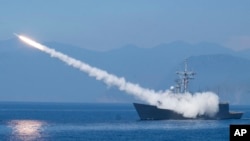Next week, Taiwan will host military exercises and drills that include defending the island's main international airport from an attack, stopping amphibious landings, and ensuring sea lanes stay open in response to a mock blockade by China.
The annual Han Kuang and Wan An exercises, which last from July 24 to July 29, also will include shelter-in-place and evacuation drills in districts across the island for the first time ever.
This year's drills, the most diverse and comprehensive to date, come as China's military threats around the island have become increasingly frequent and specific.
Analysts tell VOA that the drills are aimed at strengthening Taiwan's ability to respond to a growing range of military threats from China and applying lessons from Russia's war in Ukraine.
"Some drills featured in this year's military exercise correspond to recent activities by the Chinese military around Taiwan," said Lin Ying-yu, a military expert at Taiwan's Tamkang University. He adds that one key aim of this year's exercises is for the drills to be conducted wherever a war may be fought.
Protecting the east, airports and bases
China claims democratically ruled Taiwan is part of its own territory and over the past year has stepped up its military threats. In addition to testing Taiwan's limits by frequently entering its Air Defense Identification Zone and crossing the median line in the Taiwan Strait, an unofficial barrier, China also has been deploying military aircraft and naval vessels to the eastern side of the island in recent months.
The mountainous eastern side of Taiwan has long been seen as a key place to protect the island's forces and is home to two major air bases. Military analysts tell VOA that increasing the island's defense capabilities on the east coast is a must.
During this year's drills, Taiwan will expand the deployment of anti-ship missiles and anti-aircraft missiles and add landing and takeoff exercises at the civilian airport in the eastern county of Taitung.
"Exercises at the civilian airport (in Taitung) will help increase the flexibility of Taiwan's air force, especially in the event of an attack on its airbases," said Su Tzu-yun, an analyst at the Institute for National Defense and Security Research (INDSR) in Taiwan. He adds that if runways at air bases are destroyed, civilian airports could be used as a backup.
While exercises in eastern Taiwan will mainly be focused on maintaining Taiwan's air combat power, the anti-airborne combat operations at the Taoyuan International Airport will focus on simulating the defense of Taiwan's busiest airport in the event of an attack by the People's Liberation Army (PLA).
The drill at Taoyuan, the island's main connection with the outside world, will test the military's ability to repel an airborne assault and simulate troops from China parachuting in, in an attempt to take over the transportation hub.
Lin from Tamkang University told VOA that the anti-airborne combat operations will help Taiwan's military learn how to conduct counterattacks if that were to ever happen.
He added that the Battle for Antonov Airport in Ukraine offered valuable lessons for this particular drill. When Russia launched its war on Ukraine, Kyiv's resistance to that attack helped stop an assault on the capital and prevented Moscow from creating an air bridge to fly in troops.
Countering a Chinese blockade
Taiwan's military will also conduct training at sea and in coastal areas during the five-day military exercise. Taiwan's defense ministry said the military will carry out a two-day anti-amphibious landing drill at three locations in northern Taiwan and the navy will conduct a joint warfare drill to simulate breaking blockades imposed by hostile forces and keep sea lanes open.
Lin from Tamkang University said these drills are part of Taiwan's responses to the two blockade-style military exercises carried out by the PLA near Taiwan over the last year. The two multi-day military exercises were part of China's response to Taiwanese President Tsai Ing-wen's meeting with former U.S. House Speaker Nancy Pelosi and current U.S. House Speaker Kevin McCarthy.
"It offers an opportunity to see how Taiwan defends itself in the event of a Chinese attack," he told VOA, adding that this year's exercise is more about simulating scenarios on actual battlefields rather than being a show of firepower.
Expanded air raid, evacuation drills
In addition to the Han Kuang military exercise, Taiwan will also host a four-day Wan An air defense exercise that will require civilians to shelter in place and drivers and passengers in cars to stop their vehicles and take shelter with others.
Unlike previous air defense exercises, which only required civilians to stay indoors and to stop driving their cars, this year's drill will involve the evacuation of people to air defense shelters led by police and civil defense officials.
Since the Ukraine war broke out, INDSR's Su points out that Taiwan has expanded the scale of its annual air defense exercise, and this year's drill includes mobilizing the military, police, and civil defense forces to deal with airstrikes and coordinate disaster relief efforts.
"Previous exercises focused mostly on disaster response, but the updated training also includes war prevention," he told VOA.
Despite the expanded scope of the air defense drills, some analysts remain skeptical of the effectiveness of the pre-planned exercises.
"The only way to validate such a system is to conduct unplanned, no-warning-on-the-spot exercises of random portions of the system," Kitsch Liao, an assistant director of the Atlantic Council's Global China Hub, told VOA.
Others note that while the focus of this year's drills has expanded on the island's east coast, Taiwan should consider strengthening coordination with neighboring countries when it faces a naval blockade or when considering the potential that China cuts off its internet.
For that, some analysts argue, Taiwan should be looking for more interaction and interoperability with like-minded countries.












